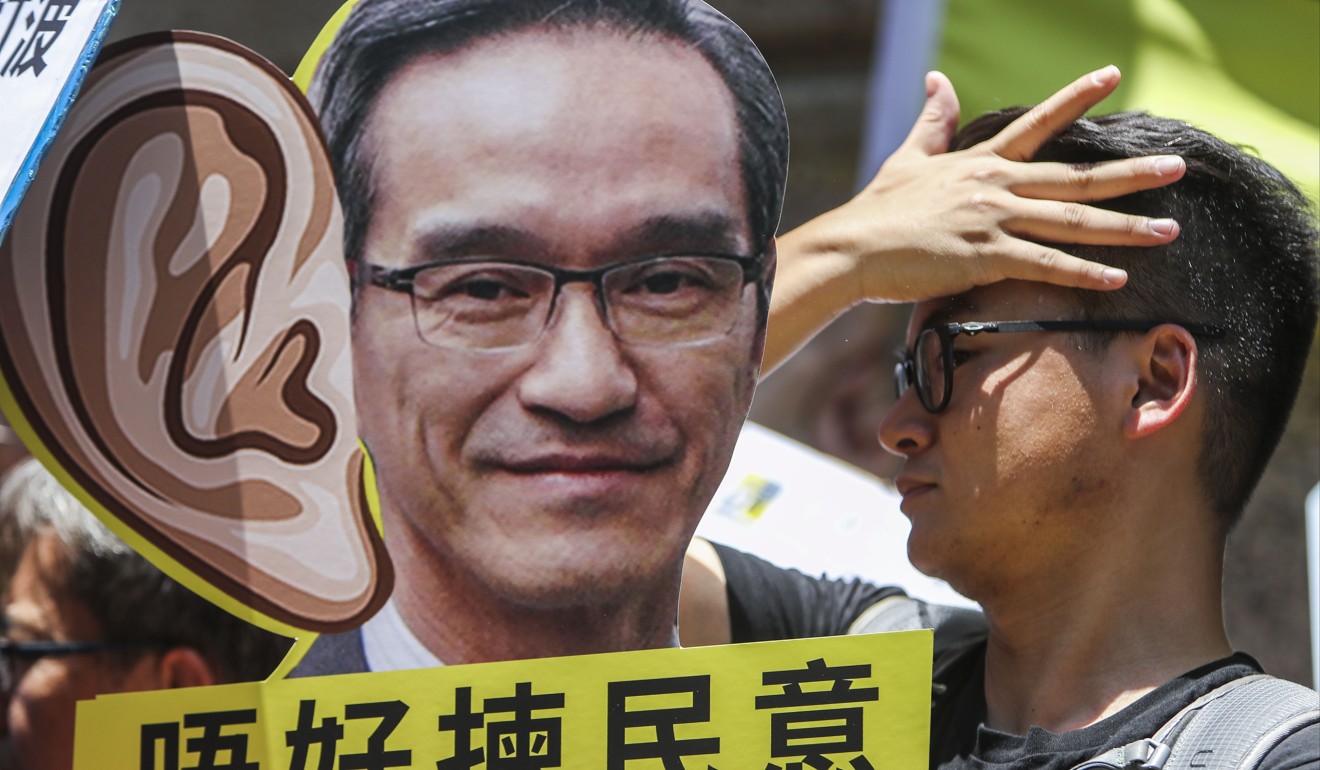
Stanley Wong didn’t have to help try to solve Hong Kong’s land shortage, but he grew up in a squatter hut and knows what it’s like to be one of city’s forgotten
- Task Force on Land Supply chairman was living the retired life of a former banker, until the government came calling
- Now after 16 months of trying to find a consensus on the way forward he talks about abuse, staying humble, and not having any regrets

Stanley Wong Yuen-fai could have chosen to continue enjoying the cushy, retired life of a banker, but instead he accepted the challenge of leading the group tasked with mapping Hong Kong’s route out of its land shortage crisis.
For the past 16 months, Wong, chairman of the government-appointed Task Force on Land Supply, has been leading one of the city’s most extensive, contentious public consultations.
The exercise aimed to forge a consensus on the best ways for Hong Kong to plug a 1,200-hectare shortage it needs over the next three decades.
On December 31, the task force unveiled its long-awaited recommendations for ramping up land supply in the space-starved city, citing considerable public support for options such as massive reclamation, using part of the Fanling golf course for building homes, and a public-private partnership to repurpose farmland owned by big developers.
The biggest question now is whether Chief Executive Carrie Lam Cheng Yuet-ngor will adopt the recommendations, or give Wong and the task force the cold shoulder, only using the report selectively to fast-track the government’s own preferences.

Lam raised eyebrows when she said it would be “irresponsible” to fully accept all suggestions by consultants, and some have accused the government of ignoring the task force.
Despite this, and being the target of insults, foul language and criticisms during the public consultation, Wong has remained stoic and unfazed throughout. The former foreign exchange trader tells the Post what lessons the public consultation has taught him, and how his humble beginnings from living in a squatter hut has kept him grounded.
Do you think the task force was able to forge a consensus on how to tackle the city’s land shortage?
Definitely. Even though this is not a 100 per cent consensus of the community as a whole, at least we have narrowed the difference for the middle 80 per cent, what we call the silent majority. By and large, this particular report has been recognised by the community as a whole as a fair reflection of the choices being taken by most of the community. Now, whether our work has helped to narrow the difference between stakeholders among different land supply options, I won’t say we’re completely successful. We all know that for each option there were bound to be those two extremes, who either strongly oppose or strongly support it.
The task force conducted 185 public engagement exercises, what’s the most difficult situation you have faced?
In one of the early City Forums by RTHK, there was a guy probably between 30 and 40 years old, he told me: “Don’t ever think about using the periphery of the country park, and if you do so …” and then he spoke foul language. It was the only occasion so far that people had sworn at me.
I’m OK, it was within my expectations. The members say I have a very high EQ [emotional quotient]. I think I’m one of the characters who would not normally be disturbed emotionally. There’s no guarantee that everybody will like you, there’s bound to be someone that hates you. Quite frankly, I won’t be disturbed. I’m still able to sleep at night.
Some people have said the government belittled the task force by only arranging for a media stand-up, forcing reporters to sit on the floor and you to stand for 80 minutes, instead of a proper press conference. What do you think?
To my understanding, the usual conference room was under renovation at the time, and none of the other meeting rooms would be able to house all the cameras and reporters in one room. A few days before stand-up, the Transport and Housing Secretary [Frank Chan Fan] also released his Long Term Housing Strategy progress report in the same spot. So, I don’t feel the task force was being belittled, or the government has actually given us a cold shoulder when we put out our report, as opposed to when we started our consultation. Quite the contrary, I would perhaps prefer the arrangement on that day, being so close together. It’s just like the feeling of a family sitting together, and having a family meeting for some household issues. Although reporters were sitting quite uncomfortably, I liked that togetherness.
Did the chief executive’s recent comment surprise you?
No, I think it’s a fair comment. She was deliberating on a general principle that the government would have to study all the recommendations being made by paid consultants, as well as by consultation committees, and not referring specifically to the task force. It doesn’t mean that the government will not, or won’t ever, accept all our proposals.
Some people assume that as a retired banker, that you were born with a silver spoon in your mouth. But what was your childhood like?
Growing up, six of us lived together in a 100 sq ft wooden squatter hut on the hillside near Tin Hau Temple Road in North Point. So, I would say life was difficult, but happy. Because we were on the hillside, we could see a great view of Victoria Harbour. But living in squatters meant that we were affected by typhoons and fire. Our roof was blown away by typhoons twice and a fire burnt down our house once even, while another time there was a fire, I ran from the house with only a shoebox in hand thinking I had saved my only leather shoes for school. But it was empty and I actually had left the shoes under the bed. It was only when I was 10 that we were resettled in public housing.
When were you able to buy your own flat?
As the eldest of four sons, I had to work early at 17 years old. I first worked at a shipping company where I earned HK$400 a month, then HK$600 a month when I started working at Standard Chartered. It was in 1983, after working for 10 years, that I bought a 637 sq ft flat in Quarry Bay in Nan Fung Sun Chuen for HK$400,000 when I got married. I emptied all my savings to pay HK$40,000 as the down payment. We had no money left for any renovations. So I did all of it myself. I built my own bookshelf from scratch to partition the living room, I put up all the wallpaper, and polished and waxed the floors myself. Looking back, it’s interesting when you recall the passages of life, trying to go from the have-nots to the haves.

What lessons do you think the consultation has taught you?
Meeting the grass-roots families living in subdivided flats, who are being affected severely by the shortage of land, has helped me learn to be humble. I would often put myself in their shoes, and I probably would have the same grievances against the government if I was in the same position as them. Fifty years ago, I used to go to Sham Shui Po and stay overnight with my grandpa who lived in cage homes. You can’t help but be shocked by the fact that, Hong Kong, being such an advanced, wealthy city, has not changed in 50 years.
Meeting the richest helped me learn and understand why one should be humble. They are the privileged among the society. To help the community as a whole, they should also be humble, but the fact that they continue to protect their interests, showed me why I should be humble. The grass roots are the majority among the community and the richest are the minority.
Any regrets?
I would say I was privileged to chair the task force in sitting down together with the community as a whole to resolve this particular issue, hopefully once and for all. It wasn’t an easy task at all, but any regrets? No. I believe we have tried our best to achieve what we had asked to do, at least we can be faithful to ourselves.
————————————————————–
PROFILE BOX
Name: Stanley Wong Yuen-fai
Age: 62
Position: Task Force on Land Supply Chairman, Housing Authority’s Subsidised Housing Committee Chairman, Advisory Council on the Environment Chairman, Urban Renewal Authority Non-Executive Director
Profession: Retired banker
Education: Master’s degree in Applied Finance and Master’s degree of Arts in Comparative and Public History
Status: Married with one daughter